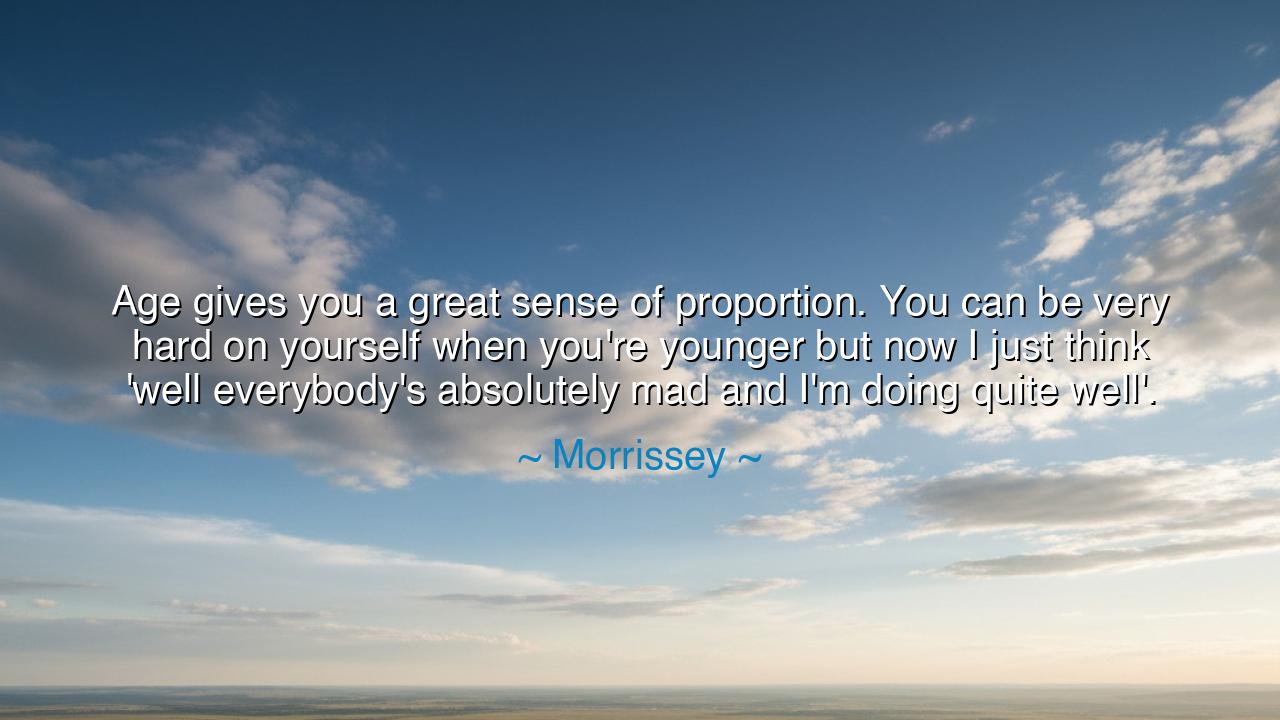
Age gives you a great sense of proportion. You can be very hard
Age gives you a great sense of proportion. You can be very hard on yourself when you're younger but now I just think 'well everybody's absolutely mad and I'm doing quite well'.






"Age gives you a great sense of proportion. You can be very hard on yourself when you're younger but now I just think 'well everybody's absolutely mad and I'm doing quite well'." — so mused Morrissey, the poet of irony and melancholy, whose words strike with the weary grace of one who has lived long among illusions. Beneath his wry humor lies a profound truth about the gift of age — that it brings with it not only years, but perspective, that quiet wisdom which tempers judgment with mercy. Youth burns with impossible ideals; it sees flaws as failure and chaos as catastrophe. But with age comes a softening, not of strength, but of understanding — the recognition that imperfection is the natural state of all things, and that to live well is simply to endure with grace amid universal madness.
In the language of the ancients, one might say: youth is a storm, but age is the harbor. When we are young, the heart demands perfection — from ourselves, from others, from the world. We measure every step against an imagined ideal and despair when the path bends. But Morrissey’s words teach that with time, the veil of seriousness lifts. We begin to laugh at the folly of our own expectations. We see that even the wise stumble, even the virtuous falter, and even the strong grow weary. What once seemed like failure reveals itself as common humanity. Thus, proportion — that noble balance — returns to the mind, and peace takes the place of pride.
To the young, he offers an unspoken warning: do not let your hunger for perfection devour your joy. In youth, the self is a battlefield — ambition against self-doubt, image against reality. Every mistake feels monumental; every misstep feels eternal. But life, as age reveals, is not a monument but a landscape — vast, uneven, and merciful. What you call ruin today will, in time, become soil for growth. When you see others err, remember Morrissey’s half-playful, half-wise refrain: “everybody’s absolutely mad.” The world is not a parade of saints and sages; it is a theatre of flawed souls doing their best to keep the light alive.
Consider the story of Leonardo da Vinci, who in his final years looked upon his own works — the Mona Lisa, the Last Supper, the sketches of flying machines — and declared, “I have offended God and mankind because my work did not reach the quality it should have.” Even a man touched by genius was hard on himself, bound by the merciless eye of youth that never quite left him. Yet what history teaches us is that his imperfection was his humanity, and his humanity was the source of his greatness. Had he lived long enough to see the reverence his art would inspire, he might have smiled, as Morrissey does, and said, “I was doing quite well.”
Age, then, is not the dimming of passion but the clarifying of vision. It teaches us to forgive the stumbling of others, to laugh at our own, and to rest more easily in the mystery of existence. It replaces the sharp edge of self-criticism with the calm acceptance of imperfection. This is not resignation — it is maturity. To recognize that the world is mad is not to surrender to its chaos, but to free oneself from the impossible burden of fixing it alone. With such understanding, even sorrow becomes bearable, and even solitude, gentle.
The lesson, therefore, is simple yet profound: do not measure yourself too cruelly, nor others too harshly. Life is not a contest of flawlessness but a pilgrimage through uncertainty. Be diligent, but not despairing; be reflective, but not regretful. Laugh at the folly of the world, and know that laughter itself is a mark of wisdom. When others rage and condemn, let your heart remember — all are mad, all are learning, all are lost and found again.
And so, my child, walk lightly upon yourself. Let age be not merely the number of years, but the depth of mercy in your spirit. Let time teach you what Morrissey discovered — that serenity lies not in perfection, but in proportion. When you can look upon the madness of the world and smile, saying, “I am doing quite well,” then you have truly grown wise. For the wise see life not as a riddle to be solved, but as a song — sometimes discordant, sometimes divine — and they are content to hum along.






AAdministratorAdministrator
Welcome, honored guests. Please leave a comment, we will respond soon